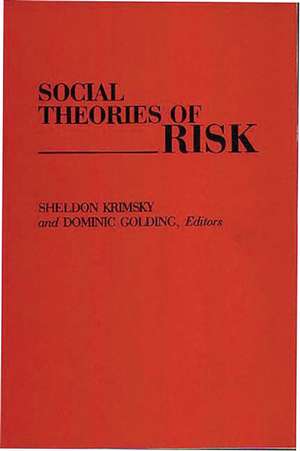Social Theories of Risk
Editat de Sheldon Krimsky, Dominic Goldingen Limba Engleză Paperback – 23 aug 1992 – vârsta până la 17 ani
| Toate formatele și edițiile | Preț | Express |
|---|---|---|
| Paperback (1) | 310.60 lei 43-57 zile | |
| Bloomsbury Publishing – 23 aug 1992 | 310.60 lei 43-57 zile | |
| Hardback (1) | 466.84 lei 43-57 zile | |
| Bloomsbury Publishing – 29 aug 1992 | 466.84 lei 43-57 zile |
Preț: 310.60 lei
Preț vechi: 376.41 lei
-17% Nou
Puncte Express: 466
Preț estimativ în valută:
59.44€ • 61.68$ • 49.68£
59.44€ • 61.68$ • 49.68£
Carte tipărită la comandă
Livrare economică 17-31 martie
Preluare comenzi: 021 569.72.76
Specificații
ISBN-13: 9780275943172
ISBN-10: 0275943178
Pagini: 432
Dimensiuni: 156 x 235 x 29 mm
Greutate: 0.63 kg
Ediția:New.
Editura: Bloomsbury Publishing
Colecția Praeger
Locul publicării:New York, United States
ISBN-10: 0275943178
Pagini: 432
Dimensiuni: 156 x 235 x 29 mm
Greutate: 0.63 kg
Ediția:New.
Editura: Bloomsbury Publishing
Colecția Praeger
Locul publicării:New York, United States
Notă biografică
SHELDON KRIMSKY is Professor of Urban and Environmental Policy at Tufts University. He has published widely on the social and ethical impacts of technology. His books include Biotechnics and Society: The Rise of Industrial Genetics (Praeger, 1991, Environmental Hazards: Communicating Risks as Social Process (Auburn House, 1988) and Genetic Alchemy: The Social History of the Recombitant DNA Controversy.DOMINIC GOLDING is a Fellow at the Center for Risk Management, Resources for the Future. He is the author of The Different Susceptibility of Workers to Occupational Hazards and contributed to The State of the Earth Atlas.
Cuprins
PrefaceConceptual and Historical PerspectivesThe Role of Theory in Risk Studies by Sheldon KrimskyA Social and Programmatic History of Risk Research by Dominic GoldingConcepts of Risk: A Classification by Ortwin RennSocial, Cultural, and Psychological ParadigmsCultural Theory and Risk Analysis by Steve RaynerPerceptions of Risk: Reflections on the Psychometric Paradigm by Paul SlovicThe Social Amplification of Risk: Progress in Developing an Integrative Framework by Roger KaspersonThe Social Arena Concept of Risk Debates by Ortwin RennSocial Drama and Risk Evaluation by Ingar PalmlundThe Role of Science in Risk AssessmentPublic Wisdom, Expert Fallibility: Toward a Conceptual Theory of Risk by Harry J. OtwayHeuristics, Biases, and the Not-so-general Publics: Expertise and Error in the Assessment of Risks by William R. FreudenburgThree Types of Risk Assessment and the Emergence of Post-normal Science by Silvio O. Funtowicz and Jerome R. RavetzRisk and Social Learning: Reification to Engagement by Brian WynnePolicy and Decision FrameworksA Conceptual Framework for Managing Low-Probability Events by Howard KunreutherExpert Knowledge and Public Values in Risk Management: The Role of Decision Analysis by Detlof von WinterfeldtInconsistent Values in Risk Management by Chris WhippleReflections by Sheldon Krimsky and Dominic GoldingBibliographyIndex























